Motor vehicle records (MVRs) and driving records are often used interchangeably, but they represent distinct documents with different levels of detail, certification, and legal standing for employment purposes. Understanding these differences is critical for HR professionals who need to make compliant hiring decisions for positions involving vehicle operation, as selecting the wrong type of record can lead to inadequate screening or unnecessary expenses.
Key Takeaways
- An MVR (Motor Vehicle Record) is the official, certified document issued directly by a state's Department of Motor Vehicles, while "driving record" is a broader term that can refer to various types of driving history reports with different certification levels.
- MVRs contain comprehensive information including current license status, violation history, accident reports, suspension records, and points accumulated, making them the gold standard for employment screening in transportation-related positions.
- Employers subject to Department of Transportation (DOT) regulations must obtain certified MVRs for driver positions, as uncertified driving history summaries typically don't meet federal compliance requirements.
- The cost difference between certified MVRs ($10-$50 per report) and basic driving record checks ($5-$15) should be weighed against the legal and safety risks associated with inadequate screening for your specific job position.
- MVRs can only be obtained with written consent from the applicant and must be used in accordance with Fair Credit Reporting Act (FCRA) requirements when obtained through third-party consumer reporting agencies.
- Different states maintain varying lookback periods for driving violations (typically 3-10 years), meaning the same driver might have different records depending on which state issues the MVR.
- HR professionals should match the type of driving record to the job risk level—certified MVRs for commercial drivers and delivery personnel, while basic driving records may suffice for occasional company vehicle use.
- Employers must provide pre-adverse action and adverse action notices to candidates when driving records influence hiring decisions, ensuring compliance with both FCRA and state-specific employment laws.
Understanding the Core Definitions
What Is a Motor Vehicle Record (MVR)?
A motor vehicle record is the official, state-maintained document that serves as the comprehensive history of an individual's driving background. Think of an MVR as the "credit report" of the driving world—it's the authoritative source that state Departments of Motor Vehicles (DMVs) or equivalent agencies maintain for every licensed driver within their jurisdiction. These records are generated directly from state databases and typically come with an official seal or certification mark that verifies authenticity.
MVRs contain detailed information that most basic reports don't include:
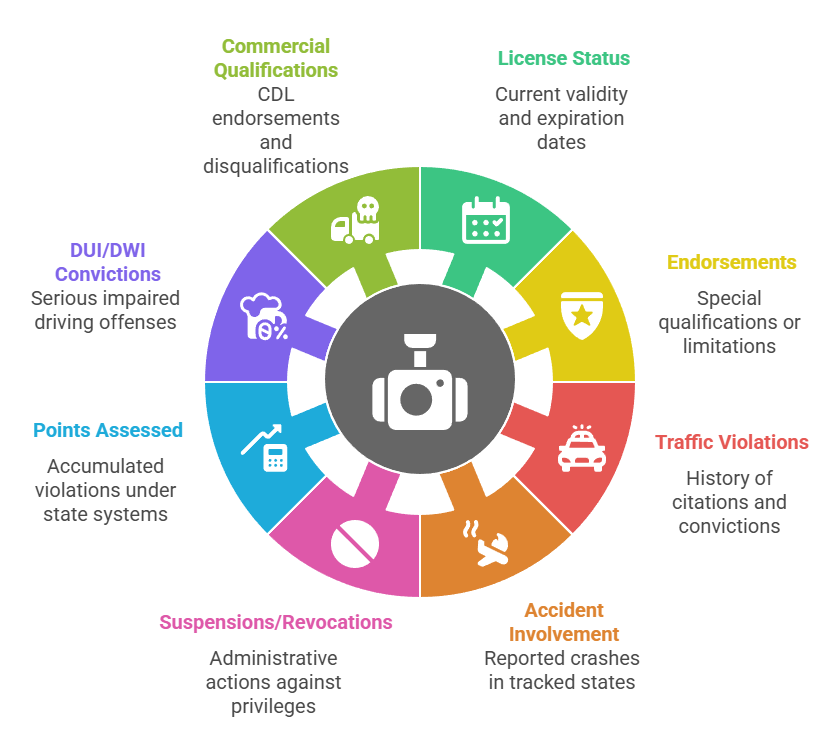
- License status and type: Current validity, class, and expiration dates
- Endorsements and restrictions: Special qualifications or limitations on driving privileges
- Traffic violations and convictions: Complete history of citations that resulted in convictions
- Accident involvement: Reported crashes in states that track this data
- License suspensions or revocations: Administrative actions against driving privileges
- Points assessed: Accumulated violations under state point systems
- DUI or DWI convictions: Serious impaired driving offenses
- Commercial driving qualifications: CDL endorsements and disqualifications
When you request an MVR, you're obtaining a document that has legal standing in court proceedings and regulatory compliance audits. The certification aspect is what distinguishes MVRs from other driving-related documents.
Hiring decisions have taught me that risk rarely announces itself upfront; it hides in the details we choose to overlook. I have seen the ways in which a normally routine activity, such as background screening, can determine whether trust is maintained or eroded down the line. The best HR procedures are less about fear and more about the obligation we have to the people our decisions impact. Oftentimes, screening has the potential to become a positive act for the organization and for the people we impact.
What Is a Driving Record?
"Driving record" is an umbrella term that encompasses various types of driving history documentation. This terminology can create confusion because it lacks the specificity that HR professionals need when developing screening policies. The term might refer to several different documents with varying levels of authority and completeness.
A driving record could mean any of the following:
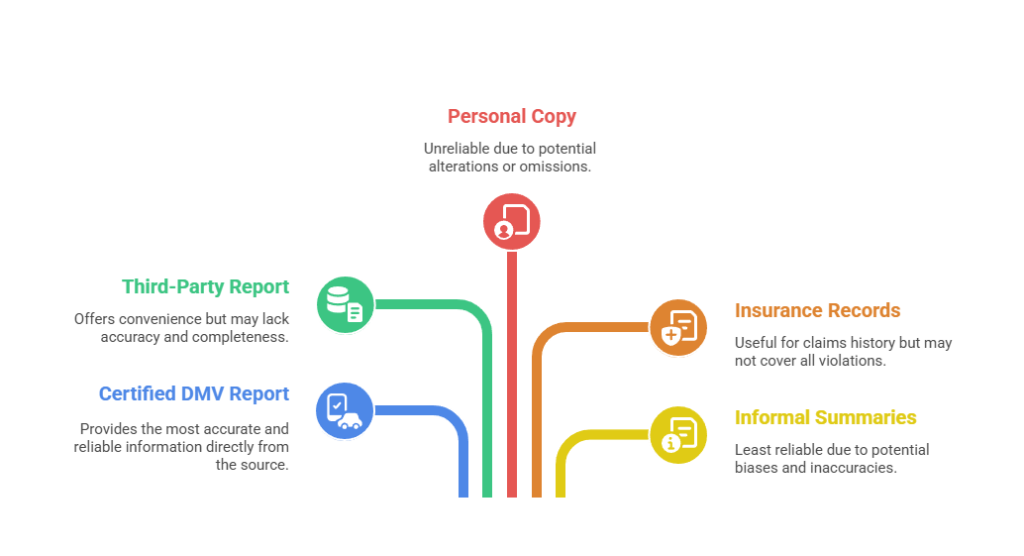
- A certified MVR obtained directly from the state DMV
- An uncertified driving history report from a third-party database
- A driver's personal copy of their driving history
- Insurance company records that track claims and violations
- Informal summaries compiled from multiple sources
When vendors or screening companies advertise "driving record checks," HR managers should ask clarifying questions. Is this a certified state MVR? Which state databases are being searched? How current is the information? What's the lookback period? These questions help ensure you're getting the appropriate level of documentation for your compliance requirements and risk management needs.
The Terminology Problem in HR and Hiring
The interchangeable use of these terms in job postings, screening policies, and vendor contracts creates real operational challenges. An HR manager might request a "driving record check" thinking they're getting a certified MVR, only to receive a basic database search that won't satisfy DOT compliance requirements or provide admissible documentation for negligent hiring defense. This confusion is compounded by state variations—California calls it a "driver record," New York refers to a "driving abstract," and Texas uses "driver record information."
To avoid confusion within your organization, establish clear definitions in your background check policies. Specify "state-certified MVR" when that level of documentation is required, rather than using the generic term "driving record." This precision protects your organization legally and ensures consistency in your hiring process across different recruiters and departments.
Key Differences That Matter for Employment Screening
Certification and Legal Standing
The certification status represents perhaps the most critical distinction between MVRs and other driving records. A certified MVR bears an official seal, signature, or certification statement from the issuing state agency, which authenticates the document and verifies that the information comes directly from the state's authoritative database. This certification provides legal defensibility when your hiring decisions are challenged.
If an employee is involved in a serious accident while driving for company business, and a subsequent lawsuit questions whether you conducted adequate pre-employment screening, a certified MVR demonstrates due diligence in a way that an uncertified database report cannot. Federal Motor Carrier Safety Administration (FMCSA) regulations explicitly require certified MVRs for commercial driver positions—uncertified reports don't satisfy these requirements. Similarly, many insurance carriers stipulate certified MVRs in their commercial auto policies, meaning failure to obtain proper documentation could affect coverage.
Information Depth and Accuracy
Certified MVRs pulled directly from state databases typically provide the most comprehensive and current information available. These records reflect updates in near real-time as violations are processed, licenses are renewed, and points are assessed or expire. Third-party database aggregators that provide uncertified driving records may rely on periodic data downloads from multiple state sources, creating potential gaps in coverage.
| Information Type | Certified MVR | Basic Driving Record |
| License status | Current, updated daily | May lag 30-90 days |
| Violation history | Complete state record | May miss recent citations |
| Certification seal | Official state seal | No certification |
| Court admissibility | Legally defensible | Limited legal standing |
| DOT compliance | Meets federal requirements | Typically insufficient |
A DUI conviction entered in the state system last week might not appear in an aggregated database for another month. For high-risk positions like commercial trucking or passenger transportation, this timing difference could have serious safety implications.
Cost and Access Considerations
Certified MVRs generally cost more than basic driving record checks—typically ranging from $10 to $50 per report depending on the state, while basic database searches might cost $5 to $15. However, this cost difference should be evaluated against the legal risks and potential liability exposure associated with inadequate screening. Access methods differ significantly as well.
Certified MVRs can be obtained through several channels:
- State DMV directly: Requires proper authorization and may take 3-7 business days
- Consumer Reporting Agencies: Registered to access state databases with instant to same-day results
- State online portals: Some states offer immediate access for bulk requesters
- Third-party screening vendors: Facilitate multi-state searches and compliance management
Driver consent requirements apply to all methods. Under FCRA, when you use a third-party screening company to obtain MVRs, you must provide applicants with a clear disclosure and obtain their written authorization. The access restrictions exist because MVRs contain personal information protected under the Driver's Privacy Protection Act (DPPA).
When to Use Each Type of Record
Positions Requiring Certified MVRs
Certain job categories demand the thoroughness and legal standing that only certified MVRs provide. Commercial driver positions requiring a CDL—including truck drivers, bus drivers, and delivery drivers operating vehicles over 26,000 pounds—fall under DOT regulations that explicitly mandate certified MVRs as part of the hiring process. Beyond federally regulated positions, best practices suggest certified MVRs for roles where driving represents a primary job function.
Consider certified MVRs essential for these positions:
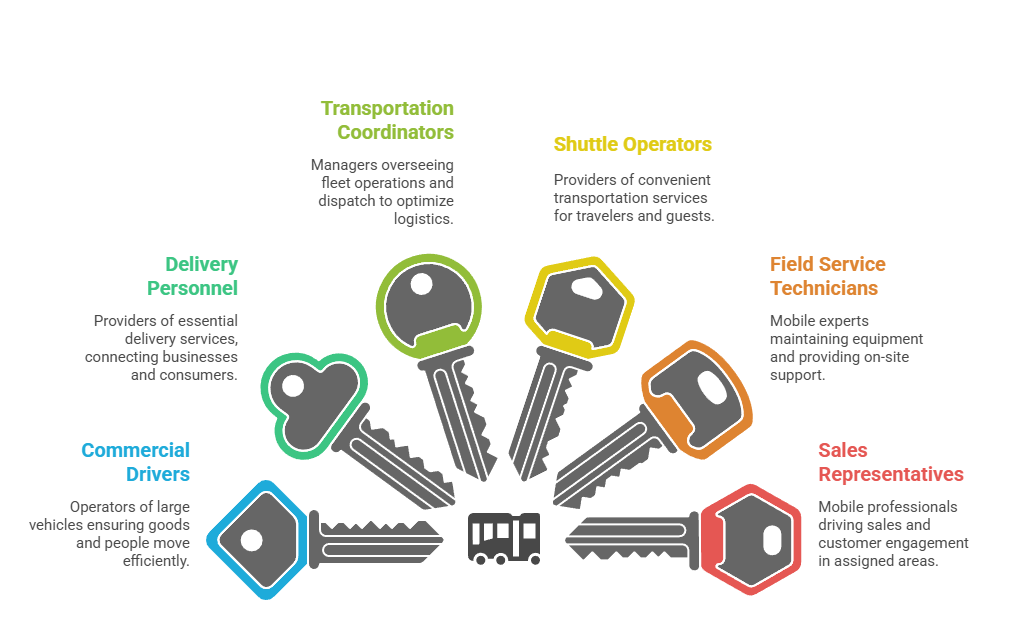
- Commercial drivers: Truck drivers, bus operators, and large vehicle operators
- Delivery personnel: Package delivery, food delivery, and courier services
- Transportation coordinators: Fleet managers and dispatch supervisors
- Shuttle or transit operators: Airport shuttles, hotel transportation, and ride services
- Field service technicians: Regular travel to customer sites with company vehicles
- Sales representatives: Assigned territories requiring daily driving
Many organizations also require certified MVRs for positions with company vehicle assignments, even when driving isn't the primary duty. The decision should be guided by frequency of driving, vehicle type, cargo or passenger sensitivity, and your organization's risk tolerance.
When Basic Driving Records May Suffice
For positions with minimal driving requirements—employees who might occasionally drive to off-site meetings or make rare supply runs—basic driving records may provide adequate information without the higher cost of certified MVRs. These situations typically involve incidental driving that represents a small fraction of job duties and minimal liability exposure. Consider a graphic designer who works primarily in-office but occasionally drives to print vendors, or an IT specialist who visits remote offices quarterly.
Some organizations use a tiered approach:
- Initial screening: Basic driving records for preliminary candidate evaluation
- Final verification: Certified MVRs required only for finalists or upon hire
- Moderate-risk positions: Balances cost management with risk mitigation
Remember that any driving record used for employment decisions triggers FCRA obligations, including disclosure, authorization, and adverse action procedures. The level of certification doesn't change your compliance responsibilities regarding how you use the information.
Decision Framework for HR Professionals
Developing a clear decision framework helps ensure consistency and defensibility in your screening practices. Start by categorizing positions into risk tiers based on driving frequency, vehicle type, passenger or cargo sensitivity, and potential liability exposure. For high-risk positions, certified MVRs should be non-negotiable—these roles create the greatest potential for accidents, injuries, and liability claims.
| Risk Level | Position Examples | Recommended Check | Frequency |
| High | CDL drivers, bus operators | Certified MVR | Annual or more |
| Moderate | Sales reps, field technicians | Certified MVR | Annual |
| Low | Occasional office errands | Basic record or none | As needed |
Moderate-risk positions require case-by-case analysis considering multiple factors. Document your rationale for the screening level selected. Low-risk positions might not require formal driving checks at all, unless company policy or insurance requirements mandate universal screening. Always verify that your screening criteria are job-related and consistent with business necessity, as required by Equal Employment Opportunity Commission (EEOC) guidance.
What Information Each Record Contains
Standard MVR Components
A comprehensive certified MVR typically includes several key data categories that paint a complete picture of driving history. Personal identification contains the driver's full legal name, date of birth, license number, and sometimes physical description—critical information for ensuring you're reviewing the correct individual's record, especially with common names. License status shows current validity, class, issue and expiration dates, and any endorsements or restrictions.
The violation history section forms the core of most MVR reviews:
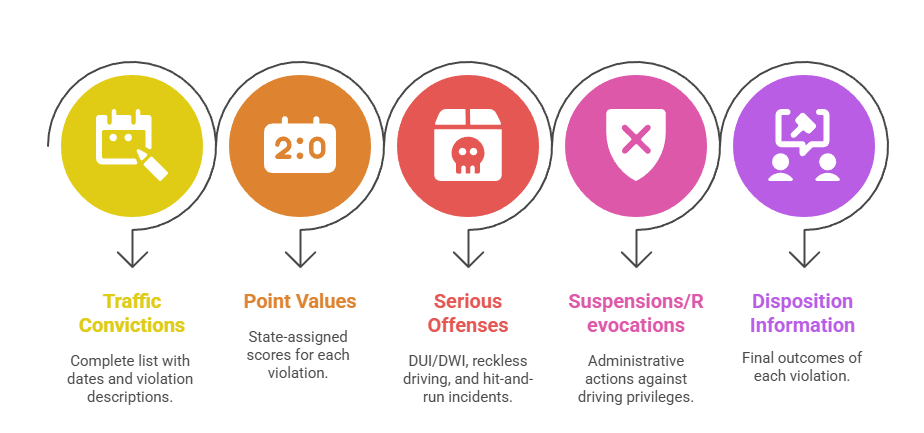
- Traffic convictions: Complete list with dates and violation descriptions
- Point values: State-assigned scores for each violation
- Serious offenses: DUI/DWI, reckless driving, and hit-and-run incidents
- Suspensions and revocations: Administrative actions against driving privileges
- Disposition information: Final outcomes of each violation
Some states include additional information like organ donor status, out-of-state violations reported through interstate compacts, and commercial driver disqualifications. The comprehensiveness varies by state, which is why reviewing records from all states where an applicant held licenses during the lookback period provides the most complete picture.
Information Gaps and Limitations
Even certified MVRs have inherent limitations that HR professionals should understand. Most significantly, MVRs only include violations that resulted in convictions—citations that were dismissed, reduced, or are pending resolution typically don't appear. An applicant currently facing serious charges might have a clean MVR if the court case hasn't concluded. Timing delays affect accuracy as well, with conviction processing taking 30-90 days.
Private property accidents generally don't appear unless they resulted in citations. Out-of-state violations sometimes don't transfer completely between state systems, though interstate data sharing has improved significantly. Parking violations, non-moving violations, and warnings don't appear on MVRs either.
State-by-State Variations
State differences in MVR content, format, and access procedures create complexity for multi-state employers. Lookback periods vary considerably across jurisdictions. California maintains three years for most violations and ten years for DUI, while New York shows three years for minor violations and ten years for serious offenses. Some states include all violations in the driver's lifetime, though oldest offenses may not affect current standing.
| State | Minor Violations | Major Violations | DUI Lookback |
| California | 3 years | 7 years | 10 years |
| New York | 3 years | 10 years | 10 years |
| Texas | 3 years | Lifetime | Lifetime |
| Florida | 3-5 years | 10-75 years | 75 years |
Access rules and costs also vary significantly. Some states offer instant online access to employers, while others require written requests and several days processing. When developing national hiring standards, account for these state-specific variations to ensure both thorough screening and legal compliance.
The Compliance and Legal Landscape
FCRA Requirements for Driving Records
The Fair Credit Reporting Act governs how employers use driving records obtained through third-party Consumer Reporting Agencies (CRAs). Before requesting the record, you must provide the applicant with a clear, standalone disclosure that a background check will be conducted, and obtain written authorization. This disclosure cannot be buried in the employment application—it must be a separate document.
If information in the MVR leads you to consider denying employment, FCRA requires a pre-adverse action process:
- Provide the applicant with a copy of the MVR
- Include "A Summary of Your Rights Under the Fair Credit Reporting Act"
- Allow reasonable time (typically 5-7 business days) to review and dispute inaccuracies
- Send a final adverse action notice if proceeding with the negative decision
These procedural protections exist because errors do occur in MVRs. Failure to follow these procedures can result in statutory damages, actual damages, attorney's fees, and potentially punitive damages in cases of willful noncompliance.
DOT and Industry-Specific Regulations
The Department of Transportation imposes specific MVR requirements for employers in transportation industries. Under FMCSA regulations (49 CFR 391.23), motor carriers must obtain driving records from each state where the driver held a motor vehicle license during the preceding three years. These records must be obtained directly from the state agencies and must be part of the driver qualification file.
Similar requirements exist across transportation sectors:
- School districts: Bus driver MVRs for state licensing compliance
- Transit authorities: Commercial driver background verification
- Healthcare organizations: Patient transport service screening
- Childcare facilities: Transportation program safety requirements
Beyond legal requirements, industry best practices often exceed minimum standards. Many transportation and logistics companies conduct MVR checks every 6-12 months for existing drivers, not just at hire and annually.
State-Specific Employment Laws
Individual states layer additional requirements onto federal baseline standards. Some states limit how far back employers can consider certain driving violations—similar to ban-the-box laws for criminal records. Massachusetts prohibits employers from asking about misdemeanor convictions more than three years old, which can affect how driving violations are considered. California requires individualized assessments when criminal history is used in employment decisions, weighing factors like nature of the offense and time elapsed.
Several states restrict access to certain MVR information or limit permissible uses. Multi-state employers should work with employment counsel to ensure policies comply with the most stringent applicable law. When state and federal requirements conflict, employers must follow whichever provides greater protection to applicants and employees.
Practical Implementation for HR Teams
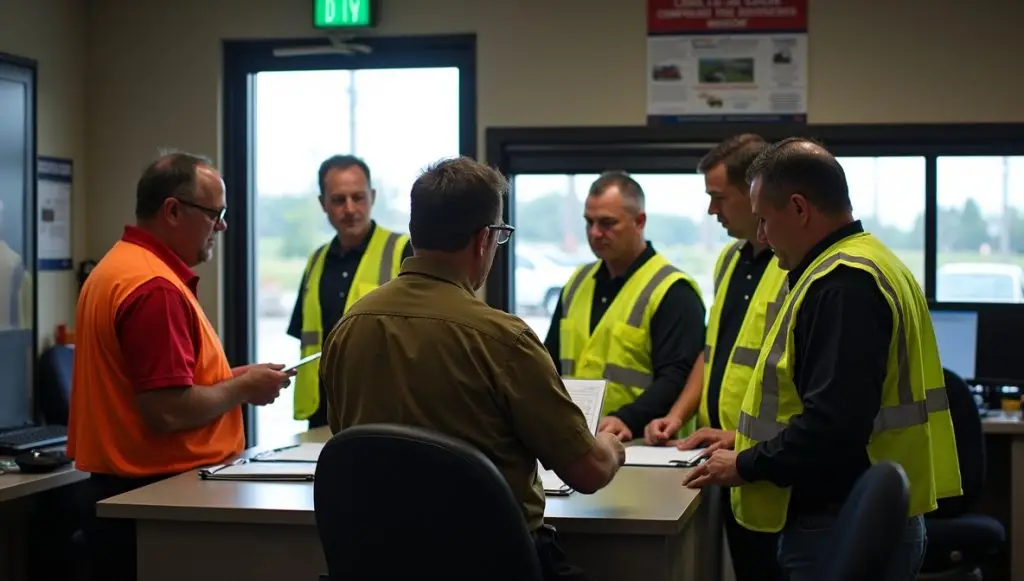
Building Your Screening Policy
An effective driving record screening policy starts with clear position categorization. Document which positions require driving, how frequently, what vehicle types, and whether passengers or sensitive cargo are involved. Your written policy should specify when driving records are obtained, what type of record is required for each position category, which states will be searched, the lookback period applied, and the evaluation criteria used.
The evaluation criteria deserve particular attention:
- Automatic disqualifiers: DUI within X years means ineligibility
- Point-based systems: Violations accumulate to a threshold
- Individualized assessments: Examine violations in context
Whatever approach you select, document it clearly and apply it consistently. Train all hiring managers and recruiters on the policy to ensure uniform implementation. Review and update the policy annually to reflect legal changes and organizational experience.
Working with Background Screening Vendors
Selecting the right background screening partner significantly impacts your MVR program's effectiveness. When evaluating vendors, verify their access methodology—do they obtain certified MVRs directly from state databases, or do they use aggregated third-party databases? Ask about coverage and turnaround times for all 50 states.
Quality vendors provide properly formatted disclosure and authorization documents, handle pre-adverse and adverse action notification processes, offer individualized assessment tools, and stay current with evolving legal requirements. Cost structure matters for budgeting—understand whether pricing is per-record, subscription-based, or tiered by volume. Technology integration capabilities affect efficiency, so consider whether the vendor's system integrates with your applicant tracking system.
Creating Efficient Workflows
Efficient MVR screening workflows balance thoroughness with time-to-hire considerations. Best practice involves obtaining driving records at the conditional offer stage—after determining the candidate is otherwise qualified but before finalizing employment. Automate wherever possible using electronic disclosure and authorization tools rather than paper forms.
Develop decision-making tools that help hiring managers interpret MVR results consistently:
- Scoring matrices: Weighted systems for different violation types
- Decision trees: Step-by-step evaluation frameworks
- Consultation protocols: Escalation paths for borderline cases
Monitor your program's effectiveness with metrics like time-to-complete MVR checks, percentage of candidates with disqualifying violations, and post-hire incidents. These data points inform policy refinements and help demonstrate program value.
Common Challenges and Solutions
Handling Discrepancies and Disputes
MVR errors do occur, creating situations where applicants dispute the information shown on their records. Common discrepancies include violations attributed to the wrong person, offenses that were dismissed but still appear, outdated information that should have been removed, and incorrect dates or disposition information. When an applicant disputes MVR information, pause your decision-making process and investigate.
Request documentation from the applicant—court records showing dismissal, proof of license reinstatement, or other official documents. Consider obtaining an updated MVR directly from the state DMV to verify whether the issue exists in the state database. If the dispute reveals a genuine error, you cannot make adverse employment decisions based on that inaccurate information.
Out-of-State License Histories
Applicants who've held licenses in multiple states present screening challenges because you need comprehensive information from all relevant states. Best practice involves asking applicants which states they've held driver's licenses in during your lookback period, then obtaining MVRs from each state. This approach captures violations that might not have transferred to the current state's record.
The question of how many previous states to search requires balancing thoroughness with practicality and cost. At minimum, obtain records from the current license state and any state where the applicant lived during the lookback period. For high-risk commercial driving positions, comprehensive searches across all states where licenses were held provides maximum protection.
Evaluating Borderline Cases
Not every violation should result in automatic disqualification, but determining which violations are acceptable requires careful judgment. Consider implementing an individualized assessment framework as recommended by EEOC guidance. This approach examines the nature and gravity of the offense, the time elapsed since the offense, and the relationship between the offense and job duties.
| Assessment Factor | Considerations | Weight in Decision |
| Violation severity | Minor vs. serious offense | High |
| Time elapsed | Recent vs. distant past | Medium |
| Pattern analysis | Isolated vs. recurring | High |
| Job relevance | Direct vs. tangential | High |
Some organizations use point-based systems that weight different violations with thresholds for different position types. Whatever framework you adopt, document your rationale for individual decisions to demonstrate consistent application of standards.
Conclusion
Understanding the distinction between MVRs and driving records empowers HR professionals to make informed screening decisions that balance legal compliance, safety requirements, and operational efficiency. Certified MVRs provide the comprehensive documentation and legal defensibility essential for positions with significant driving responsibilities, while the higher cost is justified by reduced liability exposure. By implementing clear policies, working with qualified screening vendors, and applying consistent evaluation criteria, organizations can build effective driver screening programs that protect both their workforce and business interests.
Frequently Asked Questions
Can I obtain an applicant's MVR without their permission?
No, you cannot legally obtain an applicant's MVR without their knowledge and written consent. The Driver's Privacy Protection Act (DPPA) restricts access to MVR information, and when using a third-party Consumer Reporting Agency, Fair Credit Reporting Act requirements mandate clear disclosure and written authorization. Some states impose additional consent requirements beyond federal law.
How far back do MVRs show driving violations?
The lookback period varies by state, typically ranging from 3-10 years depending on violation severity. Most states show minor traffic violations for 3-5 years, while serious offenses like DUI often remain visible for 7-10 years or longer. When screening applicants who've held licenses in multiple states, each state follows its own retention rules.
What's the difference between a 3-year and 7-year MVR?
The difference relates to the lookback period or timeframe of violations included in the report. A 3-year MVR shows driving history from the past three years, while a 7-year MVR covers seven years. DOT regulations for commercial drivers require reviewing at least three years of history, though many employers choose longer lookback periods for high-risk positions.
Are MVRs required for all employees who drive company vehicles?
Federal DOT regulations specifically require certified MVRs for commercial driver positions requiring a CDL. Beyond these mandatory requirements, whether you should obtain MVRs depends on driving frequency, vehicle type, and your organization's risk management approach. Consulting with your employment attorney and insurance carrier can help determine appropriate screening standards.
Can I reject a candidate based on a single speeding ticket?
Employment decisions should be based on job-related criteria and consistent with business necessity. A single minor speeding ticket typically wouldn't justify rejection for most driving positions. EEOC guidance recommends individualized assessments that consider the violation's severity, how recent it occurred, and the relationship between the offense and job duties.
How often should I recheck MVRs for current employees?
DOT regulations require annual MVR checks for commercial drivers holding CDLs. Beyond this baseline, many transportation companies conduct checks every 6-12 months for high-risk positions. For employees who drive occasionally, annual or biennial checks may suffice. Your monitoring frequency should reflect the actual driving exposure of each position.
What should I do if an applicant's MVR shows pending charges?
Pending charges that haven't resulted in convictions present challenging situations. EEOC guidance cautions against making employment decisions based solely on arrests without convictions. Consider delaying your hiring decision until the charge resolves if timeline permits, or consult with legal counsel about the appropriate approach given your specific situation and applicable state laws.
Do MVRs show accidents that weren't my fault?
This varies by state—some include accident information on MVRs while others don't track accidents at all. States that do include accidents may show all reported accidents regardless of fault determination. Not-at-fault accidents generally shouldn't negatively impact employment decisions, as they don't reflect the driver's behavior or judgment.
Additional Resources
- Federal Motor Carrier Safety Administration - Driver Qualification Files
https://www.fmcsa.dot.gov/regulations/title49/section/391.51 - Federal Trade Commission - Using Consumer Reports for Employment Purposes
https://www.ftc.gov/business-guidance/resources/using-consumer-reports-employment-purposes - EEOC - Background Checks and Employment Decisions
https://www.eeoc.gov/laws/guidance/background-checks-what-employers-need-know - Department of Justice - Driver's Privacy Protection Act
https://www.justice.gov/opcl/driver-s-privacy-protection-act-dppa - Professional Background Screening Association - FCRA Compliance Guide
https://www.psbsa.org/

GCheck Editorial Team
Meet the GCheck Editorial Team, your trusted source for insightful and up-to-date information in the world of employment background checks. Committed to delivering the latest trends, best practices, and industry insights, our team is dedicated to keeping you informed.
With a passion for ensuring accuracy, compliance, and efficiency in background screening, we are your go-to experts in the field. Stay tuned for our comprehensive articles, guides, and analysis, designed to empower businesses and individuals with the knowledge they need to make informed decisions.
At GCheck, we're here to guide you through the complexities of background checks, every step of the way.






